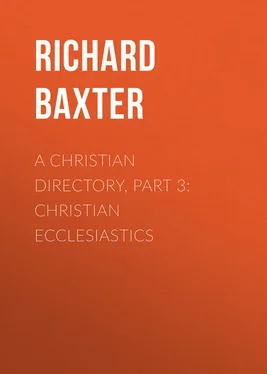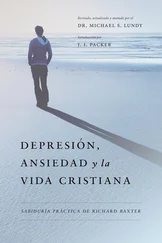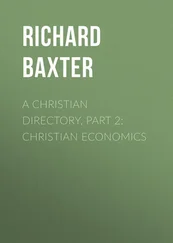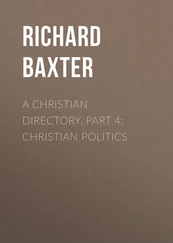Richard Baxter - A Christian Directory, Part 3 - Christian Ecclesiastics
Здесь есть возможность читать онлайн «Richard Baxter - A Christian Directory, Part 3 - Christian Ecclesiastics» — ознакомительный отрывок электронной книги совершенно бесплатно, а после прочтения отрывка купить полную версию. В некоторых случаях можно слушать аудио, скачать через торрент в формате fb2 и присутствует краткое содержание. Жанр: foreign_antique, foreign_prose, на английском языке. Описание произведения, (предисловие) а так же отзывы посетителей доступны на портале библиотеки ЛибКат.
- Название:A Christian Directory, Part 3: Christian Ecclesiastics
- Автор:
- Жанр:
- Год:неизвестен
- ISBN:нет данных
- Рейтинг книги:3 / 5. Голосов: 1
-
Избранное:Добавить в избранное
- Отзывы:
-
Ваша оценка:
- 60
- 1
- 2
- 3
- 4
- 5
A Christian Directory, Part 3: Christian Ecclesiastics: краткое содержание, описание и аннотация
Предлагаем к чтению аннотацию, описание, краткое содержание или предисловие (зависит от того, что написал сам автор книги «A Christian Directory, Part 3: Christian Ecclesiastics»). Если вы не нашли необходимую информацию о книге — напишите в комментариях, мы постараемся отыскать её.
A Christian Directory, Part 3: Christian Ecclesiastics — читать онлайн ознакомительный отрывок
Ниже представлен текст книги, разбитый по страницам. Система сохранения места последней прочитанной страницы, позволяет с удобством читать онлайн бесплатно книгу «A Christian Directory, Part 3: Christian Ecclesiastics», без необходимости каждый раз заново искать на чём Вы остановились. Поставьте закладку, и сможете в любой момент перейти на страницу, на которой закончили чтение.
Интервал:
Закладка:
Direct. III. Having soundly understood both these and other principles of religion, try all the subsequent truths hereby, and receive nothing as truth that is certainly inconsistent with any of these principles. 126 126 Nulla erga Deos pietas est, nisi honesta de numine deorum ac mente opinio sit. Cicero pro Planc.
Even principles that are not of sense, may be disputed till they are well received; and with those that have not received them: but afterwards they are not to be called in question; for then you would never proceed nor build higher, if you will stand questioning all your grounds. Indeed no truth is inconsistent with any other truth: but yet when two dark or doubtful points are compared together, it is hard to know which of them to reject. But here it is easy; nothing that contradicteth the true nature of God or man, or any principle, must be held.
Direct. IV. Believe nothing which certainly contradicteth the end of all religion. If it be of a natural or necessary tendency to ungodliness, against the love of God, or against a holy and heavenly mind and conversation, it cannot be truth, whatever it pretend.
Direct. V. Be sure to distinguish well betwixt revealed and unrevealed things: and before you dispute any question, search first whether the resolution be revealed or not: and if it be not, lay it by; and take it as part of your necessary submission, to be ignorant of what God would have you ignorant, as it is part of your obedience to labour to know what God would have you know. And when some things unrevealed are mixed in the controversy, take out those and lay them by, before you go any further, and see that the resolution of the rest be not laid upon them, nor twisted with them, to entangle the whole in uncertainty or confusion. 127 127 Non ii sumus quibus nihil verum esse videatur; sed ii qui omnibus veris falsæ quædam adjuncta esse dicamus, tanta similitudine ut, &c. Cic. de Nat. Deor. p. 7.
Thus God instructed Job, by convincing him of his ignorance, and showing him how many things were past his knowledge. 128 128 Job xxxviii-xli.
Thus Christ instructed Nicodemus about the work of regeneration, so as to let him know that though the necessity of it must be known, yet the manner of the Spirit's accesses to the soul cannot be known, John iii. 7, 8. And Paul in his discourse of election takes notice of the unsearchable depths, and the creature's unfitness to dispute with God, Rom. ix. When you find any disputes about predetermination or predestination resolved into such points as these: Whether God do by physical, premoving influx, or by concourse, or by moral operation ut finis , determine or specify moral acts of man? Whether a positive decree quoad actum be necessary to the negation of effects (as that such a one shall not have grace given him, or be converted or saved; that all the millions of possible persons, names, and things shall not be future)? What understanding, will, or power are formally in God? How he knoweth future contingents? with a hundred such like; then remember that you make use of this rule, and say with Moses, Deut. xxix. 29, "The secret things belong to the Lord our God, but those things that are revealed unto us and to our children for ever, that we may do all the words of his law." There are many rare, profound discoveries much gloried of by the masters of several sects, of which you may know the sentence of the Holy Ghost, by that instance, Col. ii. 18, "Let no man beguile you of your reward, in a voluntary humility and worshipping of angels, intruding into those things which he hath not seen, vainly puffed up by his fleshly mind." Reverently withdraw from things that are unrevealed, and dispute them not.
Direct. VI. Be a careful and accurate (though not a vain) distinguisher; and suffer not ambiguity and confusion to deceive you. Suspect every word in your question, and anatomize it, and agree upon the sense of all your common terms, before you dispute with any adversary. It is not only in many words, but in one word or syllable that so much ambiguity and confusion may be contained, as may make a long dispute to be but a vain and ridiculous wrangling. 129 129 See my preface before the second part of the Saints' Rest, edit. 3, &c. A man of judgment shall hear ignorant men differ, and know that they mean one thing. And yet they themselves will never agree. L. Bacon, Ess. 3.
Is it not a ridiculous business to hear men dispute many hours about the cur credis , and into what faith is to be resolved; and in the end come to understand, that by cur one of them speaks of the principium or causa veritatis , and the other of the principium patefactionis , or the evidentia veritatis , or some other cause? And when one speaks of the resolution of his faith as into the formal object, and another into the subservient testimony or means, or into the proofs of divine attestation, or many other causes? Or to hear men dispute, Whether Christ died for all; when by "for" one man meaneth "for the benefit of all," and another means "in the place or stead of all, or for the sins of all as the procuring cause, &c.?" Yet here is but a syllable to contain this confusion! What a tedious thing is it to read long disputes between many papists and protestants, about justification, while by justification one meaneth one thing, and another meaneth quite another thing! He that cannot force every word to make a plain confession of its proper signification, that the thing intended may be truly discerned in the word, he will but deceive himself and others, with a wordy, insignificant dispute.
Direct. VII. Therefore be specially suspicious of metaphors; as being all but ambiguities till an explication hath fixed or determined the sense. It is a noisome thing to hear some dispute upon an unexplained metaphorical word, when neither of them have enucleated the sense, and when there are proper words enow.
Direct. VIII. Take special notice of what kind of beings your inquiry or disputation is, and let your terms be adapted and interpreted according to the kind of beings you dispute of. As if you be inquiring into the nature of any grace, as faith, repentance, obedience, &c. remember that it is in genere moris , a moral act; and therefore the terms are not to be understood as if you disputed about mere physical acts, which are considered but in genere entis . For that object which must essentiate one moral act, containeth many physical particles, which will make up many physical acts. 130 130 As I have showed in my Dispute of Saving Faith with Dr. Barlow, and of Justification.
If you take such a man for your king, your commander, your master, your physician, &c. if you should at the bar, when you are questioned for unfaithfulness, dispute upon the word take, whether it be an act of the fantasy, or sense, or intellect, or will, &c. would you not be justly laughed at? So when you ask, What act faith or repentance is? which contain many particular physical acts. When you dispute of divinity, policy, law, war, &c. you must not use the same terms in the same sense, as when you dispute of physics, or metaphysics.
Direct. IX. Be sure in all your disputes that you still keep distinguished before your eyes, the order of being, and the order of knowing: that the questions de esse lying undetermined in your way, do not frustrate all your dispute about the question de cognoscere . As in the question, Whether a man should do such or such a thing, when he thinketh that it is God's command? How far conscience must be obeyed? It must first be determined de esse , whether indeed the thing be commanded or lawful, or not? before the case can be determined about the obligation that followeth my apprehension. For, whatever my conscience or opinion say of it, the thing either is lawful or it is not: if it be lawful, or a duty, the case is soon decided; but if it be not lawful, the error of my conscience altereth not God's law, nor will it make it lawful unto me. I am bound first to know and then to do what God revealeth and commandedeth; and this I shall be bound to, whatever I imagine to the contrary; and to lay by the error which is against it.
Читать дальшеИнтервал:
Закладка:
Похожие книги на «A Christian Directory, Part 3: Christian Ecclesiastics»
Представляем Вашему вниманию похожие книги на «A Christian Directory, Part 3: Christian Ecclesiastics» списком для выбора. Мы отобрали схожую по названию и смыслу литературу в надежде предоставить читателям больше вариантов отыскать новые, интересные, ещё непрочитанные произведения.
Обсуждение, отзывы о книге «A Christian Directory, Part 3: Christian Ecclesiastics» и просто собственные мнения читателей. Оставьте ваши комментарии, напишите, что Вы думаете о произведении, его смысле или главных героях. Укажите что конкретно понравилось, а что нет, и почему Вы так считаете.












